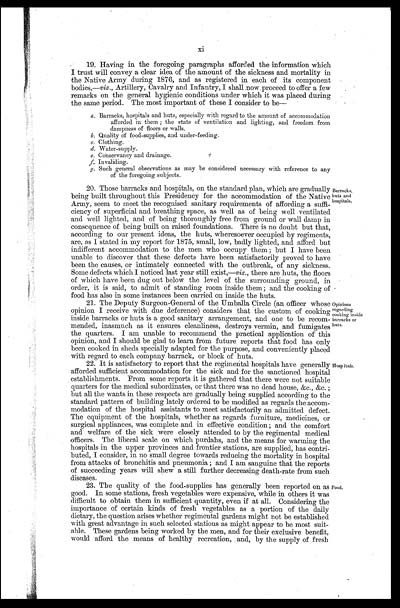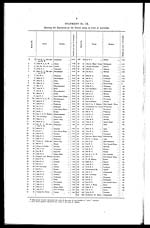Medicine - Institutions > Army health reports and medical documents > Medical and sanitary report of the native army of Bengal > Medical and sanitary report of the native army of Bengal for the year 1876
(17) Page xi
Download files
Individual page:
Thumbnail gallery: Grid view | List view

xi
19. Having in the foregoing paragraphs afforded the information which
I trust will convey a clear idea of the amount of the sickness and mortality in
the Native Army during 1876, and as registered in each of its component
bodies,—viz., Artillery, Cavalry and Infantry, I shall now proceed to offer a few
remarks on the general hygienic conditions under which it was placed during
the same period. The most important of these I consider to be—
a. Barracks, hospitals and huts, especially with regard to the amount of accommodation
afforded in them; the state of ventilation and lighting, and freedom from
dampness of floors or walls.
b. Quality of food-supplies, and under-feeding.
c. Clothing.
d. Water-supply.
e. Conservancy and drainage.
f. Invaliding.
g. Such general observations as may be considered necessary with reference to any
of the foregoing subjects.
Barracks,
huts and
hospitals.
20. Those barracks and hospitals, on the standard plan, which are gradually
being built throughout this Presidency for the accommodation of the Native
Army, seem to meet the recognised sanitary requirements of affording a suffi-
ciency of superficial and breathing space, as well as of being well ventilated
and well lighted, and of being thoroughly free from ground or wall damp in
consequence of being built on raised foundations. There is no doubt but that,
according to our present ideas, the huts, wheresoever occupied by regiments,
are, as I stated in my report for 1875, small, low, badly lighted, and afford but
indifferent accommodation to the men who occupy them; but I have been
unable to discover that these defects have been satisfactorily proved to have
been the causes, or intimately connected with the outbreak, of any sickness.
Some defects which I noticed last year still exist—viz., there are huts, the floors
of which have been dug out below the level of the surrounding ground, in
order, it is said, to admit of standing room inside them; and the cooking of
food has also in some instances been carried on inside the huts.
Opinions
regarding
cooking inside
barracks or
huts.
21. The Deputy Surgeon-General of the Umballa Circle (an officer whose
opinion I receive with due deference) considers that the custom of cooking
inside barracks or huts is a good sanitary arrangement, and one to be recom-
mended, inasmuch as it ensures cleanliness, destroys vermin, and fumigates
the quarters. I am unable to recommend the practical application of this
opinion, and I should be glad to learn from future reports that food has only
been cooked in sheds specially adapted for the purpose, and conveniently placed
with regard to each company barrack, or block of huts.
Hospitals.
22. It is satisfactory to report that the regimental hospitals have generally
afforded sufficient accommodation for the sick and for the sanctioned hospital
establishments. From some reports it is gathered that there were not suitable
quarters for the medical subordinates, or that there was no dead house, &c., &c.;
but all the wants in these respects are gradually being supplied according to the
standard pattern of building lately ordered to be modified as regards the accom-
modation of the hospital assistants to meet satisfactorily an admitted defect.
The equipment of the hospitals, whether as regards furniture, medicines, or
surgical appliances, was complete and effective condition; and the comfort
and welfare of the sick were closely attended to by the regimental medical
officers. The liberal scale on which purdahs, and the means for warming the
hospitals in the upper provinces and frontier stations, are supplied, has contri-
buted, I consider, in no small degree towards reducing the mortality in hospital
from attacks of bronchitis and pneumonia; and I am sanguine that the reports
of succeeding years will shew a still further decreasing death-rate from such
diseases.
Food.
23. The quality of the food-supplies has generally been reported on as
good. In some stations, fresh vegetables were expensive, while in others it was
difficult to obtain them in sufficient quantity, even if at all. Considering the
importance of certain kinds of fresh vegetables as a portion of the daily
dietary, the question arises whether regimental gardens might not be established
with great advantage in such selected stations as might appear to be most suit-
able. These gardens being worked by the men, and for their exclusive benefit,
would afford the means of healthy recreation, and, by the supply of fresh
Set display mode to: Large image | Zoom image | Transcription
Images and transcriptions on this page, including medium image downloads, may be used under the Creative Commons Attribution 4.0 International Licence unless otherwise stated. ![]()
| Permanent URL | https://digital.nls.uk/74997981 |
|---|




